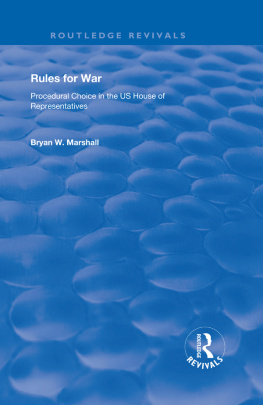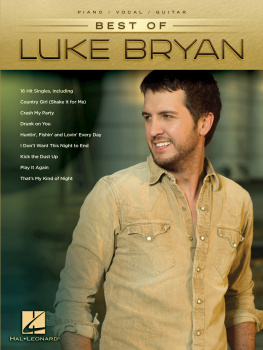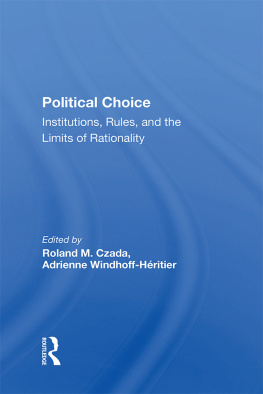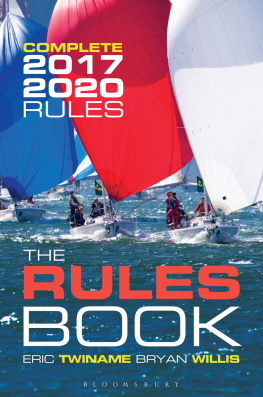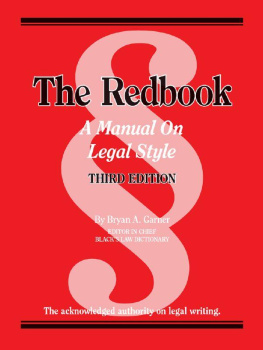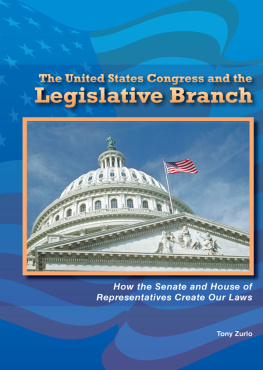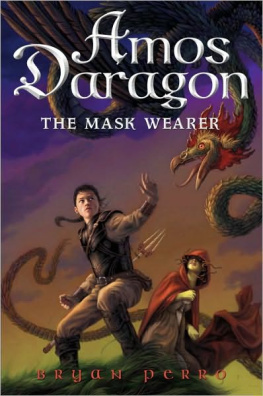RULES FOR WAR
Rules for War
Procedural Choice in the US House of Representatives
BRYAN W. MARSHALL
Miami University, Oxford, USA
First published 2005 by Ashgate Publishing
Reissued 2019 by Routledge
2 Park Square, Milton Park, Abingdon, Oxon, OX14 4RN
52 Vanderbilt Avenue, New York, NY 10017
Routledge is an imprint of the Taylor & Francis Group, an informa business
Copyright 2005, Bryan W. Marshall
Bryan W. Marshall has asserted his right under the Copyright, Designs and Patents Act, 1988, to be identified as the author of this work.
All rights reserved. No part of this book may be reprinted or reproduced or utilised in any form or by any electronic, mechanical, or other means, now known or hereafter invented, including photocopying and recording, or in any information storage or retrieval system, without permission in writing from the publishers.
Notice:
Product or corporate names may be trademarks or registered trademarks, and are used only for identification and explanation without intent to infringe.
Publishers Note
The publisher has gone to great lengths to ensure the quality of this reprint but points out that some imperfections in the original copies may be apparent.
Disclaimer
The publisher has made every effort to trace copyright holders and welcomes correspondence from those they have been unable to contact.
A Library of Congress record exists under LC control number:
ISBN 13: 978-0-8153-9162-3 (hbk)
ISBN 13: 978-1-351-14972-3 (ebk)
Contents
Certainly, institutional context can go a long way in explaining human behavior and development. But individuals are the key ingredient comprising institutions and there have been many contributing to my development and research. Dave Rohde is the first on my list. Dave Rohde provided me with the opportunity to pursue my research as a fellow of the Political Institutions and Public Choice program (PIPC) at Michigan State University. Dave served many roles including that of my chair, mentor, and friend. Thank you Dave for all that you have done.
During my stay as a PIPC fellow at Michigan State University, there were many other faculty that played an important role in helping me develop the ideas in this book. I would like to thank Jim Granato, Darren Davis, Ken Williams, Brian Silver, Tom Hammond, Larry Heimann, Dennis Patterson, Carol Weissert, Scott Gates, Mark Jones, Reggie Sheehan, Robert Lowry, Paul Abramson, Arthur Melzer, and Warner Dannhauser. Also, there are a number of people scattered across various institutions that I would like to thank as well including Brandon Prins, Jason Roberts, Chuck Finnocchiaro, Jamie Carson, Mike Crespin, Duke Duchesne, Roger Moiles, Bill Hixon, Mathew Kleiman, Mark Hurwitz, Chris Butler, Renee Agress, and Malia Reddick.
Finally, I am very indebted to my supportive family. I would like to thank my parents, my brothers, and especially my loving and beautiful wife Candace. She has been my refuge during the life of this project.
The US Constitution delegates to Congress both the authority to pass laws and the right to organize its internal institutions. These constitutional prerogatives share a vital linkage that makes for an incredibly dynamic legislature in that collective choices over the latter can make the passage of some policies more feasible than others. Indeed, the fact that procedural choices tend to be far removed from public scrutiny makes them no less important for understanding whether Congress enacts certain policies or the types of policies Congress chooses. The potential for such a shared dynamic between procedure and policy was certainly not lost on early practitioners. Ever since the days of Speaker Thomas Reed (R-ME, 1889-91, 1895-99), the House Rules Committee and special rules have played a critical role in the policy making process (Roberts and Smith 2005; Cox and McCubbins 2005). Procedural conflicts in Congress are as routine now, as they were back then, because members anticipate how these rules for war can provide advantages to win on policy.
Adding to this dynamic is the bicameral nature of Congress where different rules have evolved in each chamber that determines how members make collective policy decisions. In the Senate, the legislative agenda is usually established through negotiation between party leaders and the existence of super-majoritarian consensus. However, the House agenda is governed by a more complicated and less egalitarian process that relies on special rules. Special rules represent House resolutions that are reported by the Rules Committee. They are central to controlling the Houses agenda because once adopted by a floor majority, the resolutions effect is to take particular bills from House calendars to the floor for debate. Special rules not only determine which bills are brought to the floor, but they also set the terms of debate, specify which amendments are allowed, and sometimes even waive standing rules of the House that could prevent a bills consideration. Special rules are thus one of the most effective mechanisms the House has to alter its own legislative agenda and procedures.
The role of the House Rules Committee and the use of special rules to pass legislation are key institutional concerns for Members of Congress (MC) because public policy represents Congresss primary collective currency. Not surprisingly, this makes the study of how special rules are used and the institutional control over the Rules Committee tremendously important for assessing questions related to theories of congressional design (Bach and Smith 1988; Krehbiel 1991; Cox and McCubbins 1993; Binder 1997; Binder and Smith 1997; Aldrich and Rohde 2000; Roberts 2004). Indeed, this book applies a principal-agent framework to understand the changing role of the House Rules Committee and to assess how the use of special rules has affected policy making during the post-reform Congress. In particular, the book examines how majority party members empowered its leadership with the ability to use special rules and the partisan consequences that have resulted.
Institutional Choices as Sources of Party Strength
Within the US House of Representatives, members of the majority party are in a formidable position relative to the members of the minority party to coordinate their behavior in pursuit of individual and collective ends. One of the most critical aspects of this coordination is the choice to delegate institutional powers (Rohde 1991; Sinclair 1992). For example, Cox and McCubbins (1993) have asserted that majority party members choose to coordinate House organization to usurp its institutional powers (especially legislative committees) for the purpose of producing collective goods. In this context, institutional powers are employed by the majority party to create a valued party reputation for re-election. Rohde (1991) has argued that when members of the majority party agree upon collective policy ends, they will be inclined to grant party leaders powers in the pursuit of such ends. One intended consequence of the transfer of institutional power to party leadership is to move policy away from the floor median and closer to the central preferences of the party caucus (Aldrich and Rohde 1996).
Both of these views suggest that collective party goals, whether electoral or policy, are largely derived from the shared electoral conditions in member districts. These electoral conditions are commonly considered exogenous in terms of shaping member preferences and behavior in Congress. This suggests that party strength within Congress is necessarily shaped to some extent by external forces related to congressional elections (Cooper and Brady 1981). The more members value party reputation or collective policy ends, the more they will be willing to delegate institutional powers to their party leadership. That is, the memberships incentive to delegate institutional authority to party leaders is a function of how much their goals overlap with their fellow partisans and the degree to which they are at odds with the goals of the minority party (Rohde 1991). So in this view, institutional choices represent a vital source of party strength. Yet, the relationship between shared electoral conditions and the incentives for empowering leaders is more complex than this.


